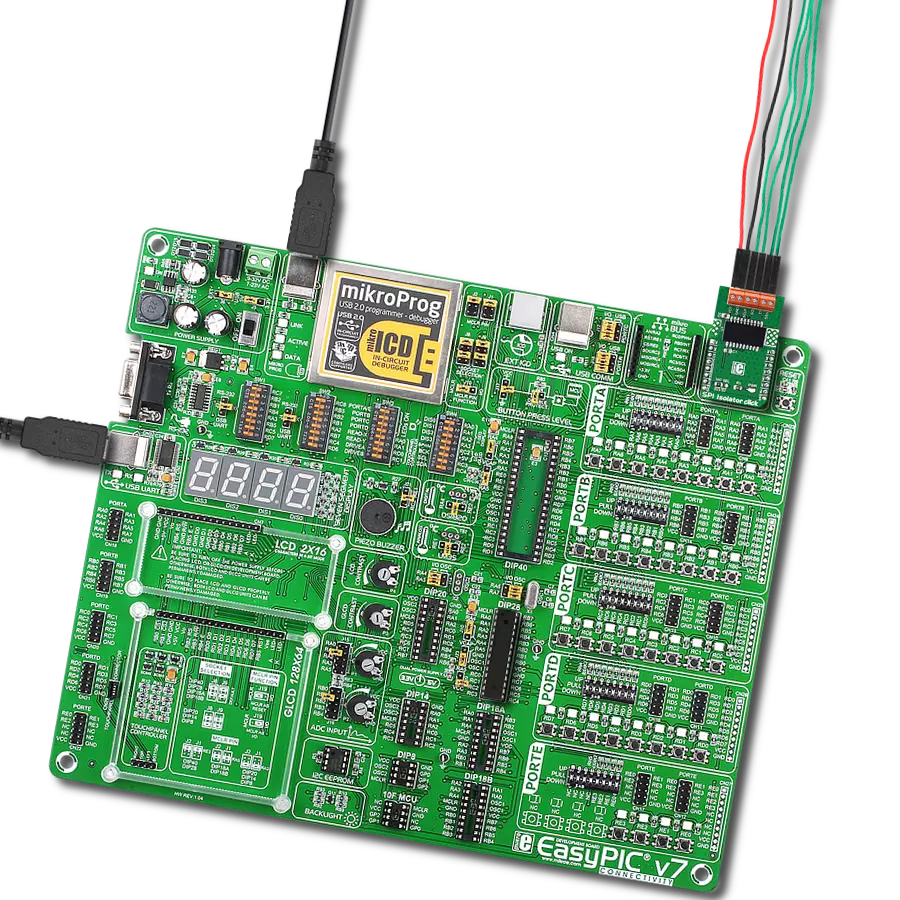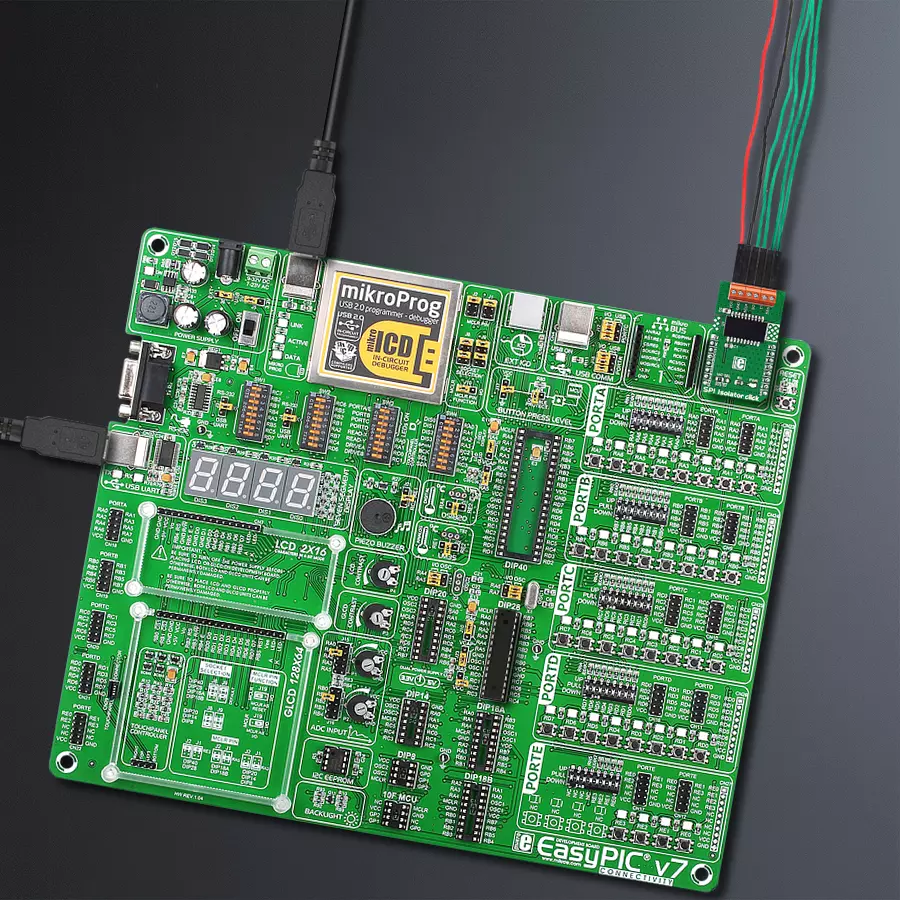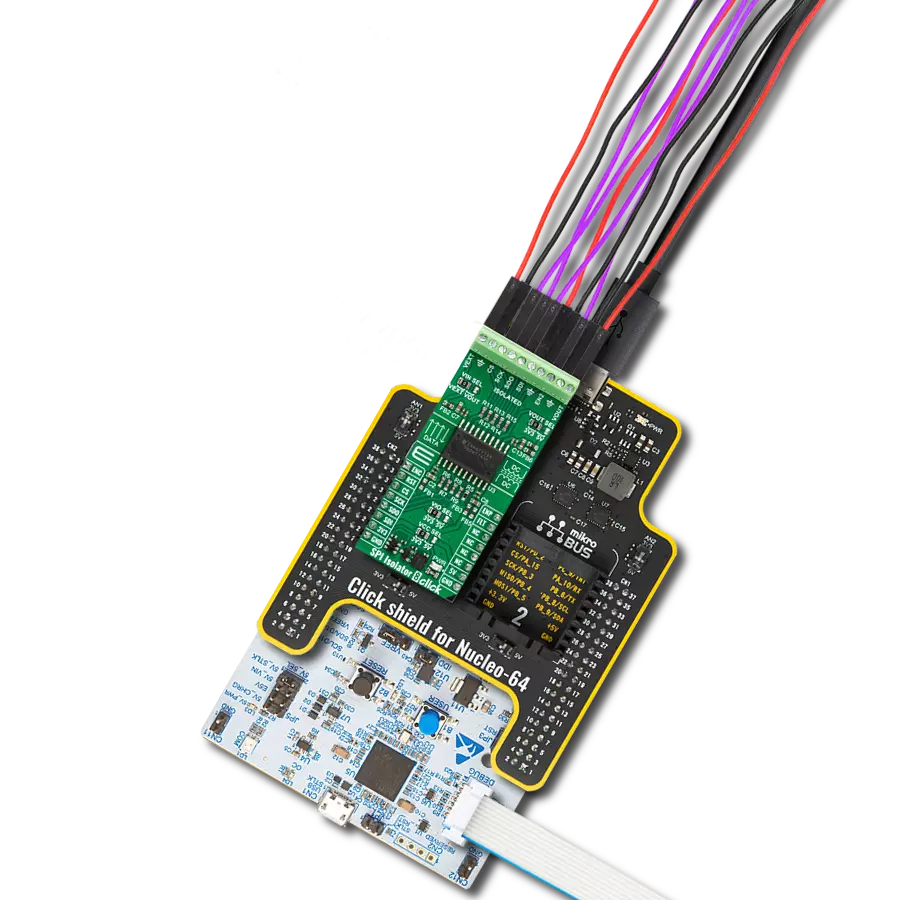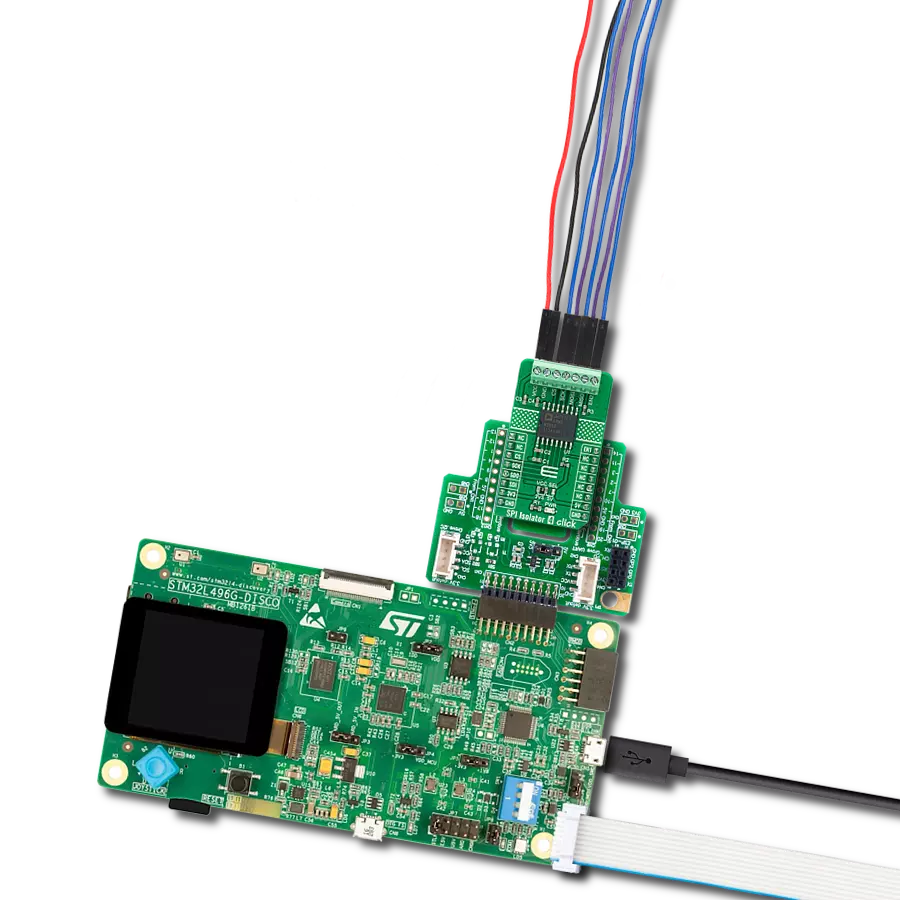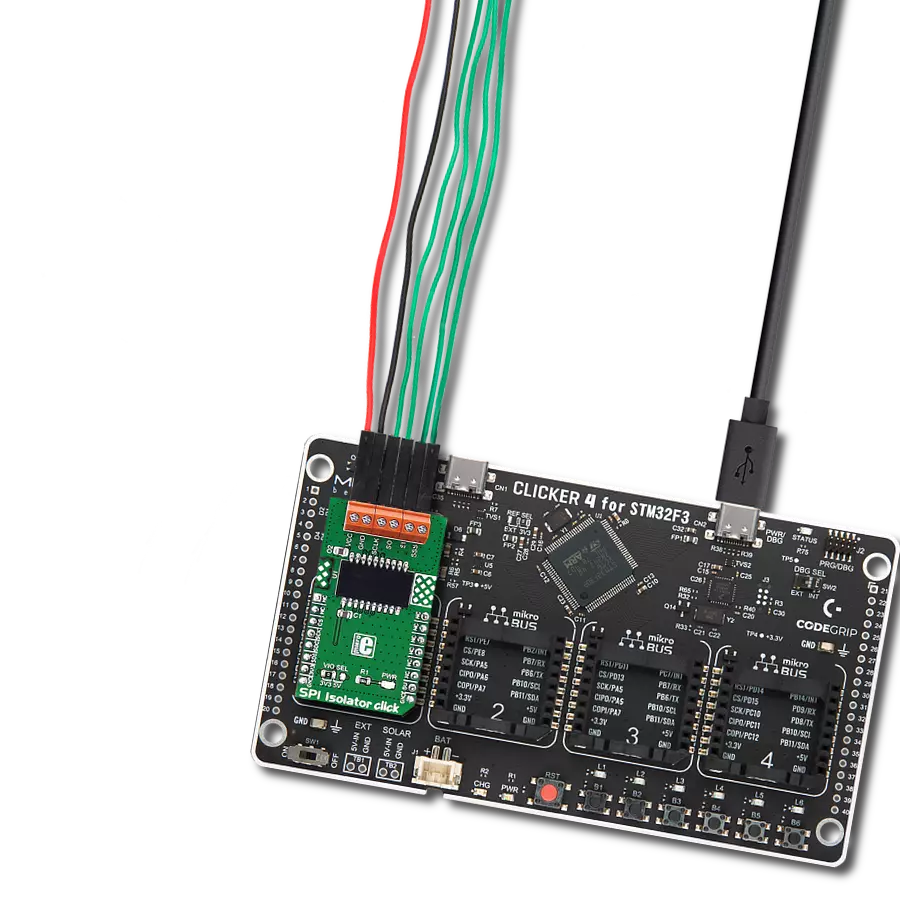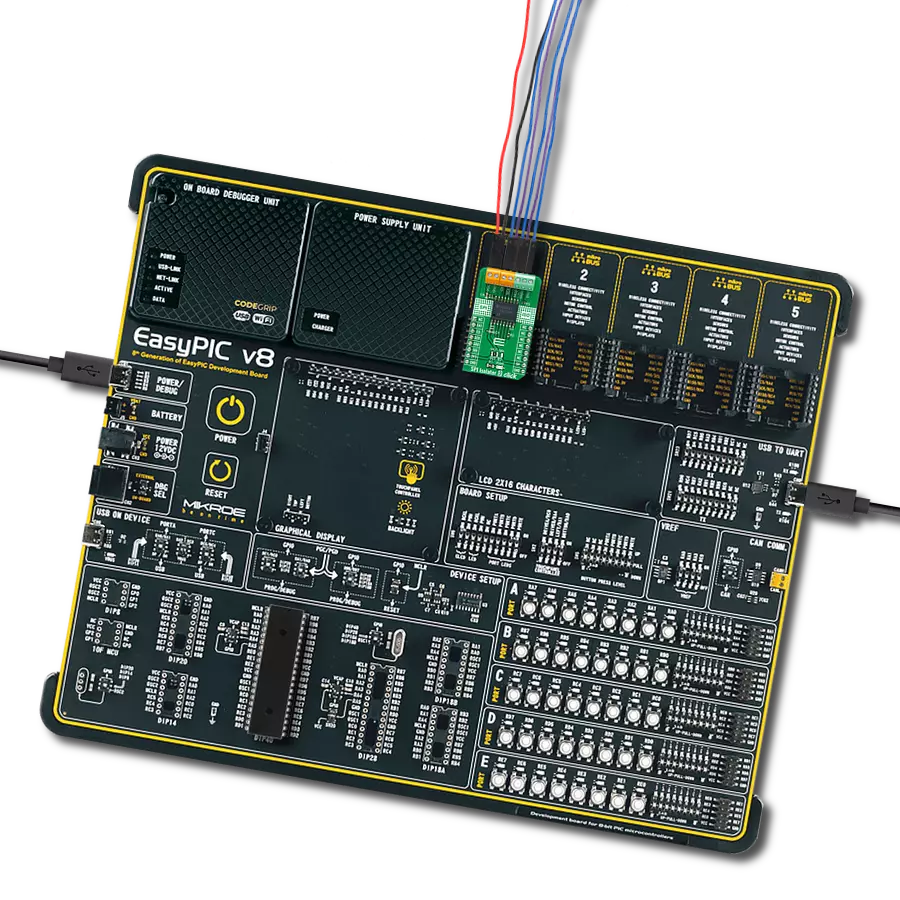This isolator represents a versatile solution for isolating and protecting digital signals, making them an essential component in electronic systems where signal integrity and safety are paramount
A
A
Hardware Overview
How does it work?
SPI Isolator Click is based on the ADuM4154, a 5kV digital isolator optimized for a serial peripheral interface (SPI) from Analog Devices. The click is designed to run on either a 3.3V or 5V power supply. It communicates with the target microcontroller over the SPI interface. The ADuM4154 has four high-speed channels. The first
three channels, CLK, MI/SO, and MO/SI (the slash indicates the connection of the particular input and output channel across the isolator), are optimized for either low propagation delay in the B grade or high noise immunity in the A grade. This Click board™ can operate with either 3.3V or 5V logic voltage levels selected via the VIO SEL
jumper. This way, both 3.3V and 5V capable MCUs can use the communication lines properly. Also, this Click board™ comes equipped with a library containing easy-to-use functions and an example code that can be used as a reference for further development.
Features overview
Development board
EasyPIC v7 is the seventh generation of PIC development boards specially designed to develop embedded applications rapidly. It supports a wide range of 8-bit PIC microcontrollers from Microchip and has a broad set of unique functions, such as a powerful onboard mikroProg programmer and In-Circuit debugger over USB-B. The development board is well organized and designed so that the end-user has all the necessary elements in one place, such as switches, buttons, indicators, connectors, and others. With four different connectors for each port, EasyPIC v7 allows you to connect accessory boards, sensors, and custom electronics more efficiently than ever. Each part of
the EasyPIC v7 development board contains the components necessary for the most efficient operation of the same board. An integrated mikroProg, a fast USB 2.0 programmer with mikroICD hardware In-Circuit Debugger, offers many valuable programming/debugging options and seamless integration with the Mikroe software environment. Besides it also includes a clean and regulated power supply block for the development board. It can use various external power sources, including an external 12V power supply, 7-23V AC or 9-32V DC via DC connector/screw terminals, and a power source via the USB Type-B (USB-B) connector. Communication options such as
USB-UART and RS-232 are also included, alongside the well-established mikroBUS™ standard, three display options (7-segment, graphical, and character-based LCD), and several different DIP sockets. These sockets cover a wide range of 8-bit PIC MCUs, from PIC10F, PIC12F, PIC16F, PIC16Enh, PIC18F, PIC18FJ, and PIC18FK families. EasyPIC v7 is an integral part of the Mikroe ecosystem for rapid development. Natively supported by Mikroe software tools, it covers many aspects of prototyping and development thanks to a considerable number of different Click boards™ (over a thousand boards), the number of which is growing every day.
Microcontroller Overview
MCU Card / MCU
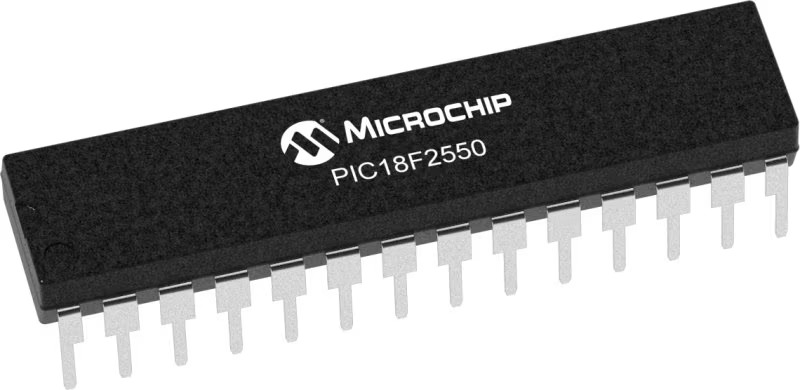
Architecture
PIC
MCU Memory (KB)
32
Silicon Vendor
Microchip
Pin count
28
RAM (Bytes)
2048
Used MCU Pins
mikroBUS™ mapper
Take a closer look
Click board™ Schematic

Step by step
Project assembly
Track your results in real time
Application Output
1. Application Output - In Debug mode, the 'Application Output' window enables real-time data monitoring, offering direct insight into execution results. Ensure proper data display by configuring the environment correctly using the provided tutorial.

2. UART Terminal - Use the UART Terminal to monitor data transmission via a USB to UART converter, allowing direct communication between the Click board™ and your development system. Configure the baud rate and other serial settings according to your project's requirements to ensure proper functionality. For step-by-step setup instructions, refer to the provided tutorial.
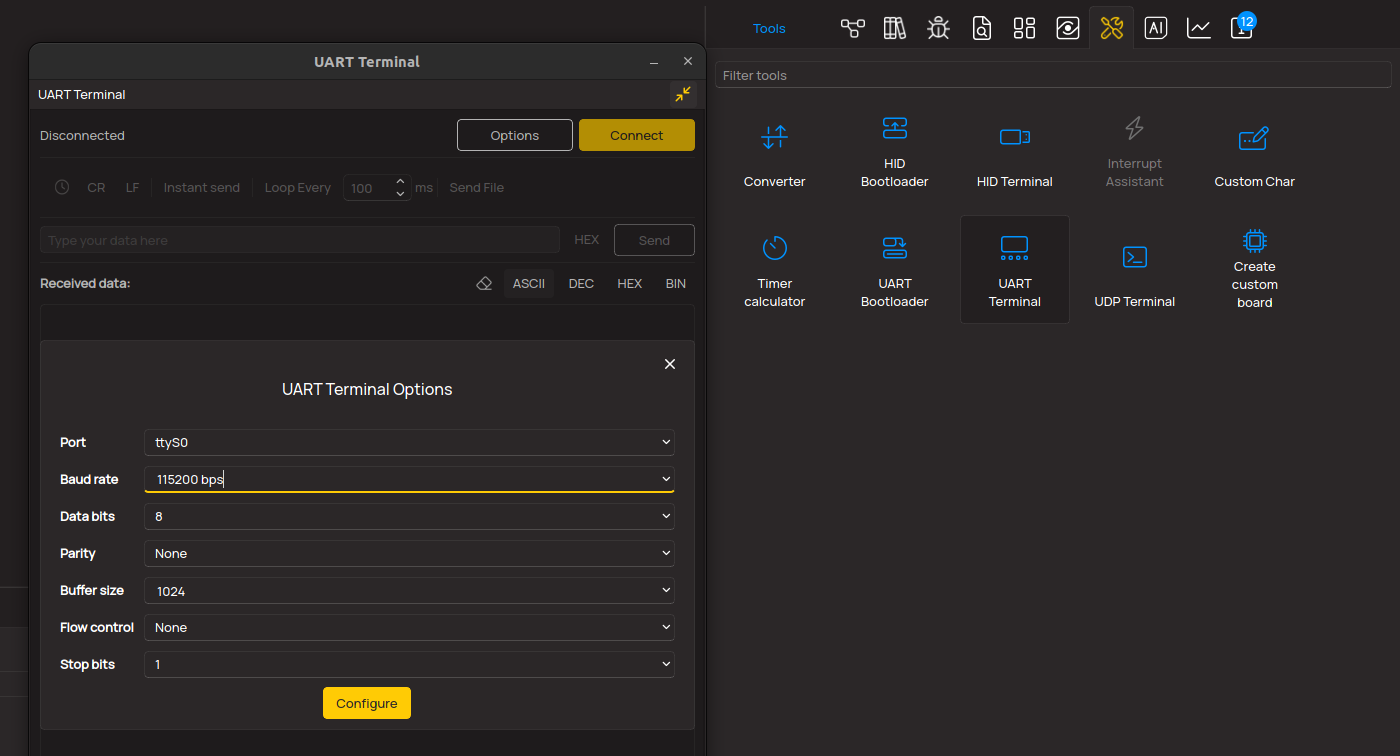
3. Plot Output - The Plot feature offers a powerful way to visualize real-time sensor data, enabling trend analysis, debugging, and comparison of multiple data points. To set it up correctly, follow the provided tutorial, which includes a step-by-step example of using the Plot feature to display Click board™ readings. To use the Plot feature in your code, use the function: plot(*insert_graph_name*, variable_name);. This is a general format, and it is up to the user to replace 'insert_graph_name' with the actual graph name and 'variable_name' with the parameter to be displayed.
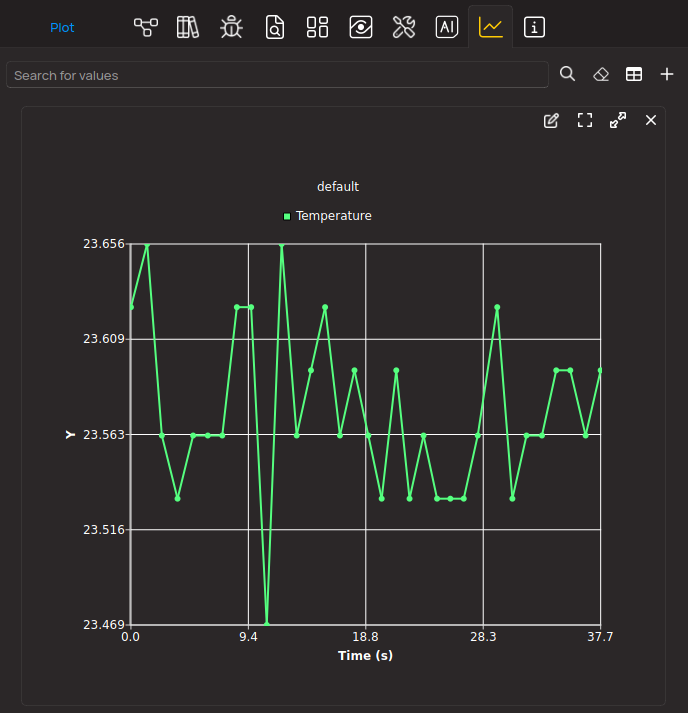
Software Support
Library Description
This library contains API for SPI Isolator Click driver.
Key functions:
spiisolator_generic_transfer- Generic transfer functionspiisolator_write_byte- Write the byte of data functionspiisolator_read_byte- Read the byte of data function
Open Source
Code example
The complete application code and a ready-to-use project are available through the NECTO Studio Package Manager for direct installation in the NECTO Studio. The application code can also be found on the MIKROE GitHub account.
/*!
* \file
* \brief Spiisolator Click example
*
* # Description
* The Click is designed to run on either 3.3V or 5V power supply. It communicates with the target microcontroller over SPI interface.
* In this example we have used an 8x8 Click board connected to a SPI Isolator Click board.
*
* The demo application is composed of two sections :
*
* ## Application Init
* Initialization driver enables - SPI, set default configuration, also write log.
*
* ## Application Task
* Controls an 8x8 Click board and displays the steps on UART Terminal.
*
* \author MikroE Team
*
*/
// ------------------------------------------------------------------- INCLUDES
#include "board.h"
#include "log.h"
#include "spiisolator.h"
// ------------------------------------------------------------------ VARIABLES
static spiisolator_t spiisolator;
static log_t logger;
uint8_t demo_string[ 11 ] = { ' ', '-', 'M', 'i', 'k', 'r', 'o', 'E', '-', ' ', 0 };
uint8_t demo_img_on [ 8 ] = { 0x08, 0x1c, 0x36, 0x22, 0x08, 0x1c, 0x36, 0x22 };
uint8_t demo_img_off[ 8 ] = { 0xf7, 0xe3, 0xc9, 0xdd, 0xf7, 0xe3, 0xc9, 0xdd };
char demo_char = 'A';
static const uint8_t ascii_matrix[][ 10 ] = {
{ 0x00, 0x00, 0x00, 0x00, 0x00, 0x00, 0x00, 0x00, 0x00, 0x0 }, // space -- 32
{ 0x00, 0x00, 0x0, 0x0, 0x60, 0xfa, 0xfa, 0x60, 0x0, 0x0 }, // ! -- 33
{ 0x00, 0x00, 0x0, 0xc0, 0xe0, 0x0, 0x0, 0xe0, 0xc0, 0x0 }, // " -- 34
{ 0x00, 0x00, 0x28, 0xfe, 0xfe, 0x28, 0xfe, 0xfe, 0x28, 0x0 }, // # -- 35
{ 0x00, 0x00, 0x00, 0x00, 0x00, 0x00, 0x00, 0x00, 0x00, 0x0 }, // $ -- 36
{ 0x00, 0x00, 0x62, 0x66, 0xc, 0x18, 0x30, 0x66, 0x46, 0x0 }, // % -- 37
{ 0x00, 0x00, 0xc, 0x5e, 0xf2, 0xba, 0xec, 0x5e, 0x12, 0x0 }, // & -- 38
{ 0x00, 0x00, 0x0, 0x0, 0x20, 0xe0, 0xc0, 0x0, 0x0, 0x0 }, // ' -- 39
{ 0x00, 0x00, 0x0, 0x0, 0x38, 0x7c, 0xc6, 0x82, 0x0, 0x0 }, // ( -- 40
{ 0x00, 0x00, 0x0, 0x0, 0x82, 0xc6, 0x7c, 0x38, 0x0, 0x0 }, // ) -- 41
{ 0x00, 0x00, 0x10, 0x54, 0x7c, 0x38, 0x38, 0x7c, 0x54, 0x10}, // * -- 42
{ 0x00, 0x00, 0x0, 0x10, 0x10, 0x7c, 0x7c, 0x10, 0x10, 0x0 }, // + -- 43
{ 0x00, 0x00, 0x0, 0x0, 0x0, 0x18, 0x1c, 0x0, 0x0, 0x0 }, // , -- 44
{ 0x00, 0x00, 0x0, 0x10, 0x10, 0x10, 0x10, 0x10, 0x10, 0x0 }, // - -- 45
{ 0x00, 0x00, 0x0, 0x0, 0x0, 0x6, 0x6, 0x0, 0x0, 0x0 }, // . -- 46
{ 0x00, 0x00, 0x6, 0xc, 0x18, 0x30, 0x60, 0xc0, 0x80, 0x0 }, // / -- 47
{ 0x00, 0x00, 0x7c, 0xfe, 0x8a, 0x92, 0xa2, 0xfe, 0x7c, 0x00}, // 0 -- 48
{ 0x00, 0x00, 0x0, 0x2, 0x42, 0xfe, 0xfe, 0x2, 0x2, 0x00}, // 1 -- 49
{ 0x00, 0x00, 0x42, 0xc6, 0x8e, 0x9a, 0x92, 0xf6, 0x66, 0x00}, // 2 -- 50
{ 0x00, 0x00, 0x22, 0x63, 0x49, 0x49, 0x49, 0x7F, 0x36, 0x00}, // 3 -- 51
{ 0x00, 0x00, 0x18, 0x38, 0x68, 0xca, 0xfe, 0xfe, 0xa, 0x0 }, // 4 -- 52
{ 0x00, 0x00, 0x0 , 0xf4, 0xf6, 0x92, 0x92, 0x92, 0x9e, 0x8c}, // 5 -- 53
{ 0x00, 0x00, 0x3c, 0x7e, 0xd2, 0x92, 0x92, 0x1e, 0xc, 0x00}, // 6 -- 54
{ 0x00, 0x00, 0x0, 0x0, 0x80, 0x9e, 0xb0, 0xe0, 0xc0, 0x0 }, // 7 -- 55
{ 0x00, 0x00, 0x6c, 0xfe, 0x92, 0x92, 0x92, 0xfe, 0x6c, 0x0 }, // 8 -- 56
{ 0x00, 0x00, 0x60, 0xf2, 0x92, 0x92, 0x96, 0xfc, 0x78, 0x0 }, // 9 -- 57//
{ 0x00, 0x00, 0x0, 0x0, 0x0, 0x66, 0x66, 0x0, 0x0, 0x0 }, // : -- 58
{ 0x00, 0x00, 0x0, 0x0, 0x0, 0x6c, 0x6e, 0x0, 0x0, 0x0 }, // ; -- 59
{ 0x00, 0x00, 0x0, 0x0, 0x10, 0x38, 0x6c, 0xc6, 0x82, 0x0 }, // < -- 60
{ 0x00, 0x00, 0x0, 0x24, 0x24, 0x24, 0x24, 0x24, 0x24, 0x0 }, // = -- 61
{ 0x00, 0x00, 0x0, 0x82, 0xc6, 0x6c, 0x38, 0x10, 0x0, 0x0 }, // > -- 62
{ 0x00, 0x00, 0x40, 0xc0, 0x80, 0x9a, 0xba, 0xe0, 0x40, 0x0 }, // ? -- 63
{ 0x00, 0x00, 0x7c, 0xfe, 0x82, 0xba, 0xaa, 0xf8, 0x78, 0x0 }, // @ -- 64
{ 0x00, 0x00, 0x3e, 0x7e, 0xd0, 0x90, 0xd0, 0x7e, 0x3e, 0x0 }, // A -- 65
{ 0x00, 0x00, 0x82, 0xfe, 0xfe, 0x92, 0x92, 0xfe, 0x6c, 0x0 }, // B -- 66
{ 0x00, 0x00, 0x38, 0x7c, 0xc6, 0x82, 0x82, 0xc6, 0x44, 0x0 }, // C -- 67
{ 0x00, 0x00, 0x82, 0xfe, 0xfe, 0x82, 0xc6, 0x7c, 0x38, 0x0 }, // D -- 68
{ 0x00, 0x00, 0x82, 0xfe, 0xfe, 0x92, 0xba, 0x82, 0xc6, 0x0 }, // E -- 69
{ 0x00, 0x00, 0x82, 0xfe, 0xfe, 0x92, 0xb8, 0x80, 0xc0, 0x0 }, // F -- 70
{ 0x00, 0x00, 0x38, 0x7c, 0xc6, 0x82, 0x8a, 0xce, 0x4e, 0x0 }, // G -- 71
{ 0x00, 0x00, 0xfe, 0xfe, 0x10, 0x10, 0x10, 0xfe, 0xfe, 0x0 }, // H -- 72
{ 0x00, 0x00, 0x0, 0x0, 0x82, 0xfe, 0xfe, 0x82, 0x0, 0x0 }, // I -- 73
{ 0x00, 0x00, 0x0, 0xe, 0x2, 0x82, 0xfe, 0xfc, 0x80, 0x0 }, // J -- 74
{ 0x00, 0x00, 0x82, 0xfe, 0xfe, 0x10, 0x38, 0xee, 0xc6, 0x0 }, // K -- 75
{ 0x00, 0x00, 0x82, 0xfe, 0xfe, 0x82, 0x2, 0x6, 0xe, 0x0 }, // L -- 76
{ 0x00, 0x00, 0xfe, 0xfe, 0x70, 0x38, 0x70, 0xfe, 0xfe, 0x0 }, // M -- 77
{ 0x00, 0x00, 0xfe, 0xfe, 0x60, 0x30, 0x18, 0xfe, 0xfe, 0x0 }, // N -- 78
{ 0x00, 0x00, 0x7c, 0xfe, 0x82, 0x82, 0x82, 0xfe, 0x7c, 0x0 }, // O -- 79
{ 0x00, 0x00, 0x82, 0xfe, 0xfe, 0x92, 0x90, 0xf0, 0x60, 0x0 }, // P -- 80
{ 0x00, 0x00, 0x7c, 0xfe, 0x82, 0x82, 0x87, 0xff, 0x7d, 0x0 }, // Q -- 81
{ 0x00, 0x00, 0x82, 0xfe, 0xfe, 0x90, 0x98, 0xfe, 0x66, 0x0 }, // R -- 82
{ 0x00, 0x00, 0x44, 0xe6, 0xb2, 0x92, 0x9a, 0xce, 0x44, 0x0 }, // S -- 83
{ 0x00, 0x00, 0x0, 0xe0, 0xc2, 0xfe, 0xfe, 0xc2, 0xe0, 0x0 }, // T -- 84
{ 0x00, 0x00, 0xfc, 0xfe, 0x2, 0x2, 0x2, 0xfe, 0xfc, 0x0 }, // U -- 85
{ 0x00, 0x00, 0xf8, 0xfc, 0x6, 0x2, 0x6, 0xfc, 0xf8, 0x0 }, // V -- 86
{ 0x00, 0x00, 0xfc, 0xfe, 0x6, 0x1c, 0x6, 0xfe, 0xfc, 0x0 }, // W -- 87
{ 0x00, 0x00, 0xc6, 0xee, 0x38, 0x10, 0x38, 0xee, 0xc6, 0x0 }, // X -- 88
{ 0x00, 0x00, 0x0, 0xe0, 0xf2, 0x1e, 0x1e, 0xf2, 0xe0, 0x0 }, // Y -- 89
{ 0x00, 0x00, 0xe2, 0xc6, 0x8e, 0x92, 0xb2, 0xe6, 0xce, 0x0 }, // Z -- 90
{ 0x00, 0x00, 0x0, 0x0, 0xfe, 0xfe, 0x82, 0x82, 0x0, 0x0 }, // [ -- 91
{ 0x00, 0x00, 0x80, 0xc0, 0x60, 0x30, 0x18, 0xc, 0x6, 0x0 }, // \ -- 92
{ 0x00, 0x00, 0x0, 0x0, 0x82, 0x82, 0xfe, 0xfe, 0x0, 0x0 }, // ] -- 93
{ 0x00, 0x00, 0x10, 0x30, 0x60, 0xc0, 0x60, 0x30, 0x10, 0x0 }, // ^ -- 94
{ 0x00, 0x00, 0x1, 0x1, 0x1, 0x1, 0x1, 0x1, 0x1, 0x1 }, // _ -- 95
{ 0x00, 0x00, 0x0, 0x0, 0x80, 0xc0, 0x60, 0x20, 0x0, 0x0 }, // ` -- 96{}
{ 0x00, 0x00, 0x4, 0x2e, 0x2a, 0x2a, 0x3c, 0x1e, 0x2, 0x0 }, // a -- 97
{ 0x00, 0x00, 0x82, 0xfe, 0xfc, 0x22, 0x22, 0x3e, 0x1c, 0x0 }, // b -- 98
{ 0x00, 0x00, 0x1c, 0x3e, 0x22, 0x22, 0x22, 0x36, 0x14, 0x0 }, // c -- 99
{ 0x00, 0x00, 0x1c, 0x3e, 0x22, 0xa2, 0xfc, 0xfe, 0x2, 0x0 }, // d -- 100
{ 0x00, 0x00, 0x1c, 0x3e, 0x2a, 0x2a, 0x2a, 0x3a, 0x18, 0x0 }, // e -- 101
{ 0x00, 0x00, 0x12, 0x7e, 0xfe, 0x92, 0x90, 0xc0, 0x40, 0x0 }, // f -- 102
{ 0x00, 0x00, 0x19, 0x3d, 0x25, 0x25, 0x3f, 0x3e, 0x20, 0x0 }, // g -- 103
{ 0x00, 0x00, 0x82, 0xfe, 0xfe, 0x30, 0x20, 0x3e, 0x1e, 0x0 }, // h -- 104
{ 0x00, 0x00, 0x0, 0x0, 0x22, 0xbe, 0xbe, 0x2, 0x0, 0x0 }, // i -- 105
{ 0x00, 0x00, 0x0, 0x6, 0x7, 0x1, 0x1, 0xbf, 0xbe, 0x0 }, // j -- 106
{ 0x00, 0x00, 0x82, 0xfe, 0xfe, 0x8, 0x1c, 0x36, 0x22, 0x0 }, // k -- 107
{ 0x00, 0x00, 0x0, 0x0, 0x82, 0xfe, 0xfe, 0x2, 0x0, 0x0 }, // l -- 108
{ 0x00, 0x00, 0x3e, 0x3e, 0x30, 0x1e, 0x30, 0x3e, 0x1e, 0x0 }, // m -- 109
{ 0x00, 0x00, 0x20, 0x3e, 0x1e, 0x20, 0x20, 0x3e, 0x1e, 0x0 }, // n -- 110
{ 0x00, 0x00, 0x1c, 0x3e, 0x22, 0x22, 0x22, 0x3e, 0x1c, 0x0 }, // o -- 111
{ 0x00, 0x00, 0x21, 0x3f, 0x1f, 0x25, 0x24, 0x3c, 0x18, 0x0 }, // p -- 112
{ 0x00, 0x00, 0x18, 0x3c, 0x24, 0x25, 0x1f, 0x3f, 0x21, 0x0 }, // q -- 113
{ 0x00, 0x00, 0x22, 0x3e, 0x1e, 0x32, 0x20, 0x30, 0x10, 0x0 }, // r -- 114
{ 0x00, 0x00, 0x12, 0x3a, 0x2a, 0x2a, 0x2a, 0x2e, 0x24, 0x0 }, // s -- 115
{ 0x00, 0x00, 0x20, 0x20, 0xfc, 0xfe, 0x22, 0x26, 0x4, 0x0 }, // t -- 116
{ 0x00, 0x00, 0x3c, 0x3e, 0x2, 0x2, 0x3c, 0x3e, 0x2, 0x0 }, // u -- 117
{ 0x00, 0x00, 0x38, 0x3c, 0x6, 0x3, 0x6, 0x3c, 0x38, 0x0 }, // v -- 118
{ 0x00, 0x00, 0x3c, 0x3e, 0x6, 0x1c, 0x6, 0x3e, 0x3c, 0x0 }, // w -- 119
{ 0x00, 0x00, 0x22, 0x36, 0x1c, 0x8, 0x1c, 0x36, 0x22, 0x0 }, // x -- 120
{ 0x00, 0x00, 0x39, 0x3e, 0x5, 0x5, 0x5, 0x3f, 0x3e, 0x0 }, // y -- 121
{ 0x00, 0x00, 0x0, 0x32, 0x26, 0x2e, 0x3a, 0x32, 0x26, 0x0 }
};
// ------------------------------------------------------- ADDITIONAL FUNCTIONS
void c8x8_display_string ( spiisolator_t *ctx, char *p_array )
{
uint8_t str_word[512];
char wr_chr;
uint8_t cnt;
uint8_t i;
uint8_t global_cnt = 0;
uint8_t char_ascii;
uint8_t position = 0;
uint8_t col = 8;
for ( i = 0; i < strlen( p_array ); i++ )
{
char_ascii = p_array[ i ] - 32;
for ( cnt = 0; cnt < 10; cnt++ )
{
str_word[ global_cnt++ ] = ascii_matrix[ char_ascii ][ cnt ];
}
}
while ( position < ( global_cnt - 8 ) )
{
for ( cnt = position; cnt < position + 8; cnt++ )
{
wr_chr = str_word[ cnt ];
spiisolator_write_cmd( ctx, col, wr_chr );
col--;
}
col = 8;
position++;
Delay_100ms( );
}
}
void c8x8_display_byte ( spiisolator_t *ctx, char tx_byte )
{
uint8_t cnt;
uint8_t char_ascii;
uint8_t position = 8;
char wr_chr;
char_ascii = tx_byte - 32;
for ( cnt = 2; cnt < 10; cnt++ )
{
wr_chr = ascii_matrix[ char_ascii ][ cnt ];
spiisolator_write_cmd( ctx, position, wr_chr );
position--;
}
}
void c8x8_display_image ( spiisolator_t *ctx, uint8_t *p_image )
{
uint8_t cnt;
uint8_t line;
uint8_t position = 8;
for ( cnt = 0; cnt < 8; cnt++ )
{
line = p_image[ cnt ];
spiisolator_write_cmd( ctx, position, line );
position--;
}
}
void c8x8_display_refresh ( spiisolator_t *ctx )
{
uint8_t cnt;
for ( cnt = 1; cnt < 9; cnt++ )
{
spiisolator_write_cmd( ctx, cnt, 0x00 );
}
}
void c8x8_default_cfg ( spiisolator_t *ctx )
{
// Click default configuration
spiisolator_write_cmd( ctx, 0x09, 0x00 ); // decode mode
spiisolator_write_cmd( ctx, 0x0A, 0x07 ); // intensity
spiisolator_write_cmd( ctx, 0x0B, 0x07 ); // scan limit
spiisolator_write_cmd( ctx, 0x0C, 0x01 ); // normal operation mode
c8x8_display_refresh( ctx );
}
// ------------------------------------------------------ APPLICATION FUNCTIONS
void application_init ( void )
{
log_cfg_t log_cfg;
spiisolator_cfg_t cfg;
/**
* Logger initialization.
* Default baud rate: 115200
* Default log level: LOG_LEVEL_DEBUG
* @note If USB_UART_RX and USB_UART_TX
* are defined as HAL_PIN_NC, you will
* need to define them manually for log to work.
* See @b LOG_MAP_USB_UART macro definition for detailed explanation.
*/
LOG_MAP_USB_UART( log_cfg );
log_init( &logger, &log_cfg );
log_info( &logger, "---- Application Init ----" );
// Click initialization.
spiisolator_cfg_setup( &cfg );
SPIISOLATOR_MAP_MIKROBUS( cfg, MIKROBUS_1 );
spiisolator_init( &spiisolator, &cfg );
c8x8_default_cfg( &spiisolator );
Delay_100ms( );
}
void application_task ( void )
{
log_info( &logger, "> Display Character ..." );
c8x8_display_byte( &spiisolator, demo_char );
Delay_ms ( 1000 );
log_info( &logger, "> Display String ..." );
c8x8_display_string( &spiisolator, &demo_string[ 0 ] );
Delay_ms ( 1000 );
log_info( &logger, "> Display Image ON ..." );
c8x8_display_image( &spiisolator, &demo_img_on[ 0 ] );
Delay_ms ( 500 );
log_info( &logger, "> Display Image OFF ..." );
c8x8_display_image( &spiisolator, &demo_img_off[ 0 ] );
Delay_ms ( 1000 );
}
int main ( void )
{
/* Do not remove this line or clock might not be set correctly. */
#ifdef PREINIT_SUPPORTED
preinit();
#endif
application_init( );
for ( ; ; )
{
application_task( );
}
return 0;
}
// ------------------------------------------------------------------------ END
